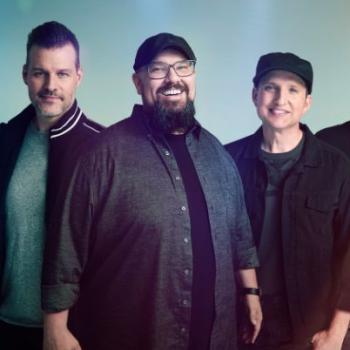I once attended a literary salon at which a woman, resolutely atheistic herself, pointed out that atheists have no story. This was a very important point, I realized later: no story versus "The Greatest Story Ever Told." The Passion Play versus an empty, darkened theater. The Word versus no word.
This is in no way meant to slam atheists; it is to marvel at the fact that a story can transport me in a way that no preachy sermon, or scholarly treatise, or op-ed article ever has. Emma Bovary's wax-covered satin slippers, Hazel Motes' rat-colored car, Raymond Chandler's "He was about as inconspicuous as a tarantula on a slice of angel food" instantly commit themselves to memory, while abstractions can't find purchase no matter how hard they try.
A friend once told me of watching a documentary about a primitive Indian tribe that had no separate word for yellow and orange and thus could not distinguish, saw no difference, between the two. What we don't have words for, in other words, we literally can't see.
Story is of particular interest to me because in a way, my work consists in telling my story. A good memoir, to my mind, springs from having experienced some kind of transformation, coupled with the deep conviction that the change couldn't have been accomplished by you. Maybe the transformation was wrought by literature; maybe it was the healing (or refusal to heal) of a childhood wound. Maybe like Jacques Lusseyran, "Blind Hero of the French Resistance," you started an anti-Nazi youth movement, spent six months at Buchenwald, and survived to write an autobiography called And There Was Light.
Whatever the transformation consists of, you have to have come to terms with it—sufficiently worked the wound through—in order to emerge from isolation and come back to the human table.
I've also come to see there is only one story, and an infinite number of ways to tell it: the story of death and resurrection.
The story can't be "I'm a victim" and it also can't be "I'm a hero," though in some sense you are telling of the hero's journey. But what makes for an authentic personal story is that the hero is not you; the heroes are the people who put up with you, or helped you, or accompanied you along the way.
The star of the story is not you; the star is something greater than you.
The astonishment of the story is never that the world finally recognized your genius and showered you with the love and attention you so richly deserved. Nor is the story that the world finally admitted its terrible betrayal of your innocence and apologized. The story is that a God exists who is so kind, so loving, so merciful, that he sees fit to forgive all your transgressions, wrong turns, and mistakes; a God who ministers, with infinite tenderness, to all the hurt that's been done to you and all the hurt you've done to others, and welcomes you back to the banquet table.
To be a sober alcoholic is to have a very particular experience of the Crucifixion and Resurrection. Just as the Gospels mostly lead up to the Passion, then give us a very short, very patchy glimpse of the Resurrection, an alcoholic's story—what it was like, what happened, what it's like now—is generally about three-quarters "drunkalogue" and one-quarter sobriety. That's not because sobriety is less "important," but because the Resurrection is inherent in the way the story is told, which is with humility, gratitude, and often humor that would do the nearest Comedy Club proud.
As with the Gospels, the drunk's Resurrection is patchy, ephemeral, incapable of being held onto. Just as on the road to Emmaus the disciples recognized Christ in the breaking of bread and he immediately vanished from their sight, an authentic story describesour moments of joy, our epiphanies on earth, as fleeting. An authentic story imparts the sense that—just as with those post-Resurrection stories in the Gospels—sometimes we "see" Christ, sometimes we don't; sometimes we recognize him in the flesh, and sometimes we experience him more as spirit.
Sometimes the act of writing itself helps us find our way back to the human table, like Hansel and Gretel's trail of breadcrumbs. I've often been struck by the similarity of the page to bread, to the consecrated Host. That the Gospel of John starts: "In the beginning was the Word, and the Word was with God, and the Word was God" can't be an accident. Our capacity for language distinguishes us from the animals. The flame of civilizationhas been passed down through the ages by the sharing of stories. And to continue the metaphor, as writers we almost become the page. We allow ourselves to be consumed: our energy, our blood and bones, our lives.





